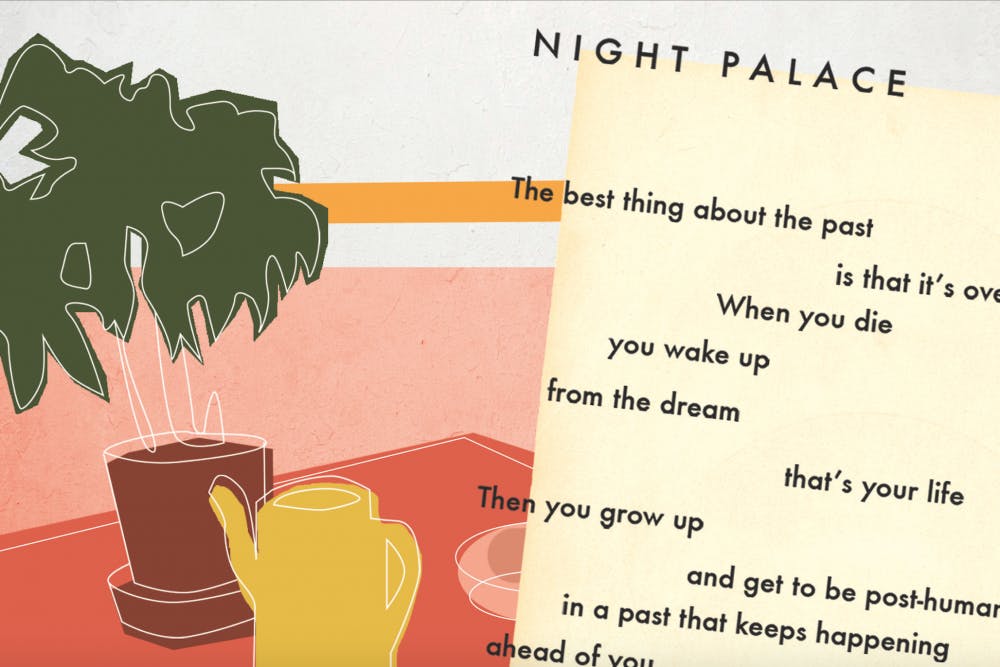Phil Elverum, known to most as prolific folk singer–songwriter Mount Eerie, lost his wife, Geneviève, to pancreatic cancer in 2016. She died three months after her 35th birthday, a year and a half after the birth of her and Elverum’s first daughter. A Crow Looked At Me was released on March 24, 2017, and is Phil Elverum’s immediate reaction to a profoundly tragic situation. The album was written in a six–week period in the September and October after her death and recorded completely using the instruments Geneviève left behind in her home studio. With predominantly guitar and voice, this project is sparse and clean, shifting the focus towards Elverum’s narrative.
He barely even sings. He talks directly, without metaphor and with absolute honesty about how he feels, although never directing or attempting to prompt an emotional response. It feels like a statement of fact, an account of his life, all the way down to the heart–wrenchingly domestic—“you still get mail …” There is a complete rejection of sympathy–prompting melodrama: no emotional crescendos or the clumsy labelling of a meaningful moment often accompanied with a death in art. Elverum is at pains to convey that real death is not a single moment, but permeates all facets of life. Sometimes the pain is dull, sometimes sharp.
The first track, "Real Death," declares this lack of agenda, as Elverum states “I don’t want to learn anything from this. I love you.” This tone continues, and it is so delicate and blunt that I kept anticipating the tranquility was about to be disturbed or punctuated with a gush of sentiment. This catharsis never comes, however, as Crow glides through the empty rooms of Elverum’s life. I cannot remember an album that has captured a sense of physical interiority more effectively, as if Elverum has sat me down across from him in his sitting room and played me these songs himself. The warm, almost soothing production mixed with his uncomfortably candid lyrics lulls and alarms me at the same time. Left powerless and confused as how to process it, I would have squirmed in Elverum’s armchair.
It is for this reason that before writing this retrospective, I must confess I was slightly dreading my re–listening of Crow. The first (and only time) I had heard the album was the day it came out last year, and, as I listened, all I could do was lie on my bed and listen to it in its entirety, paralyzed. Despite being totally captured by Elverum’s unbelievably frank lyrics and simple, enveloping sound, I declared quite soon after that I wouldn’t and (more accurately) couldn’t listen to this album again. However, the more I thought about it, the more I realized how much of an impact on me this album had had and just how unique a listening experience it was. I also realized that I had focused on precisely the wrong aspects of the record the first time around. I fixated on the tragedy aspect, which, while clearly highly compelling, did Elverum a huge disservice.
So why am I writing this for the Love Issue? Labelling this album as outright sad would be too simplistic, and, in my view, wrong. Crow is absolutely teeming with life and a love for life. Despite Elverum’s self–referential apology for continually talking about his dead wife, the snapshot that he has created of his own life is vivid and incredibly complete. A nearly empty house, while obviously tragic, has afforded Elverum the opportunity to notice everything. He is preoccupied with the mundane, all of which is elevated to a mystical status. This album is not about death exactly, but the rich metaphorical landscape that grief creates within Elverum’s own house, imbuing something as meaningless as a toothbrush with the spirit of Geneviève. These songs are so earthy, so palpable that we are right there with him, complicit in the assignation of meaning to a new backpack or a crow, regardless of how relevant it is. On "Swims," the album’s most accomplished track, Elverum’s one–year–old asks if mama swims and, after a pause, he replies that yes, she does, all the time now—they scattered her ashes over water.
It is these moments which, on second listening, have defined the album for me. By highlighting the deeply unsatisfying lack of meaning behind a (real) death, Crow desperately seeks answers in anything and everything. Elverum may have not have wanted to learn anything from this, but he has certainly taught me to appreciate my immediate surroundings and experience a profound gratitude towards those close to me. While this album is born from a death, it ends with a simple celebration of the life of Elverum’s daughter on its final track, "Crow." This song is far from devoid of sadness or the specter of Geneviève—and I doubt anything ever will be for Elverum—but we are granted a glimpse of the only kind of resolution he’ll possibly come to:
Sweet kid, I heard you murmur in your sleep / "Crow," you said / "Crow," and I asked / "Are you dreaming about a crow?" / And there she was.







